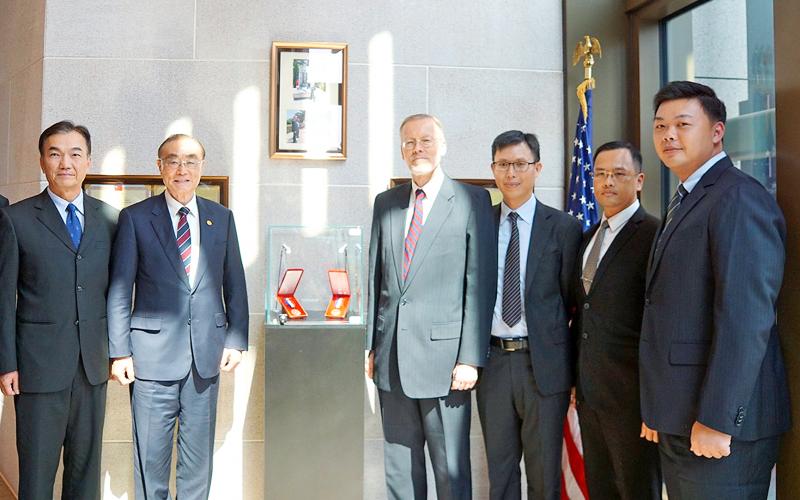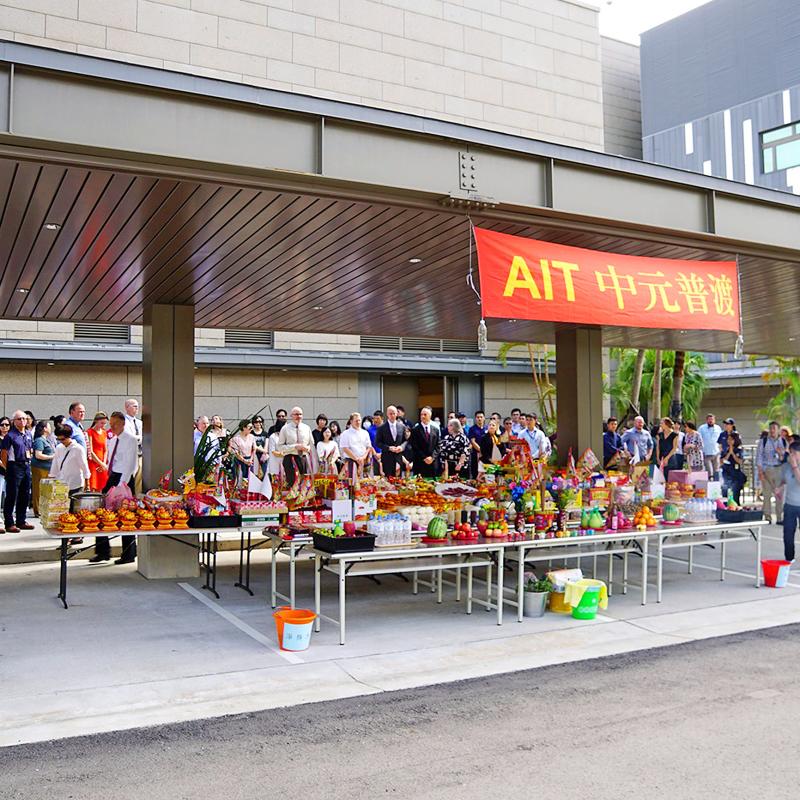US support for Taiwan’s self-defense remains firm, American Institute in Taiwan (AIT) Director Brent Christensen said yesterday at the unveiling of a memorial to honor the 126 US service members who have lost their lives defending Taiwan since 1949.
The ceremony at the institute commemorated US Lieutenant Colonel Alfred Medendorp and US Lieutenant Colonel Frank Lynn, who died defending Taiwan in 1954 in Kinmen.
Medals and framed certificates were conferred to them in 2016 by then-president Ma Ying-jeou (馬英九).

Photo courtesy of the American Institute in Taiwan
The AIT displays the medals and the certificates in the lobby of its Taipei facility.
“Beyond the sacrifices of these two brave men, these medals, this flag and this memorial are intended to honor all US personnel — past, present and future — who participated or will participate in the US-Taiwan strategic partnership to support Taiwan’s self-defense,” Christensen said.
“Many of today’s threats are different than the ones these brave men confronted. We face dangerous new technologies, a deadly pandemic and the unpredictable effects of climate change, but our partnership, rooted in tradition, continues to exemplify the mutual support, mutual respect, and mutual interests that these service members and their cohort helped to build between our societies and between our militaries,” he said.

Photo courtesy of the American Institute in Taiwan
Taiwan and the US have made great progress in security cooperation, economic and commercial partnerships, Taiwan’s participation in the international community, and promotion of people-to-people ties between the two countries in his time as AIT head, Christensen said, adding that the progress on security cooperation is particularly noteworthy.
The security relationship began during World War II and continued after the war with the establishment of the Military Assistance Advisory Group in 1951 and the US Taiwan Defense Command after the first Taiwan Strait Crisis in 1954 and 1955.
US service members were stationed throughout Taiwan, including Kinmen and Matsu during the conflict, with 126 of them perishing while providing assistance and support to Taiwan’s armed forces, Christensen said.
“Our close friendship also means that when Taiwan suffers the loss of valued comrades, as they have this year, we feel those losses as though they were our own, but as we grieve together, we also feel a renewed sense of commitment and purpose,” he said.
Veteran Affairs Council Minister Kent Feng (馮世寬) said that he was touched that the families of Medendorp and Lynn allowed the medals to reside in Taiwan.
Their presence here would show people the sacrifices the soldiers made to defend freedom and peace in Taiwan, Feng said.
Taiwan has contributed to peace and stability in East Asia for almost 60 years with US assistance and tremendous sacrifices by Taiwanese military personnel, Feng said, adding that the council and the American Legion veterans’ association would resume collaborations after the COVID-19 pandemic eases.
Earlier yesterday, the AIT posted photographs on Facebook showing Christensen and other officials preparing offerings for Ghost Festival.
Additional reporting by CNA

Right-wing political scientist Laura Fernandez on Sunday won Costa Rica’s presidential election by a landslide, after promising to crack down on rising violence linked to the cocaine trade. Fernandez’s nearest rival, economist Alvaro Ramos, conceded defeat as results showed the ruling party far exceeding the threshold of 40 percent needed to avoid a runoff. With 94 percent of polling stations counted, the political heir of outgoing Costa Rican President Rodrigo Chaves had captured 48.3 percent of the vote compared with Ramos’ 33.4 percent, the Supreme Electoral Tribunal said. As soon as the first results were announced, members of Fernandez’s Sovereign People’s Party

MORE RESPONSIBILITY: Draftees would be expected to fight alongside professional soldiers, likely requiring the transformation of some training brigades into combat units The armed forces are to start incorporating new conscripts into combined arms brigades this year to enhance combat readiness, the Executive Yuan’s latest policy report said. The new policy would affect Taiwanese men entering the military for their compulsory service, which was extended to one year under reforms by then-president Tsai Ing-wen (蔡英文) in 2022. The conscripts would be trained to operate machine guns, uncrewed aerial vehicles, anti-tank guided missile launchers and Stinger air defense systems, the report said, adding that the basic training would be lengthened to eight weeks. After basic training, conscripts would be sorted into infantry battalions that would take

EMERGING FIELDS: The Chinese president said that the two countries would explore cooperation in green technology, the digital economy and artificial intelligence Chinese President Xi Jinping (習近平) yesterday called for an “equal and orderly multipolar world” in the face of “unilateral bullying,” in an apparent jab at the US. Xi was speaking during talks in Beijing with Uruguayan President Yamandu Orsi, the first South American leader to visit China since US special forces captured then-Venezuelan president Nicolas Maduro last month — an operation that Beijing condemned as a violation of sovereignty. Orsi follows a slew of leaders to have visited China seeking to boost ties with the world’s second-largest economy to hedge against US President Donald Trump’s increasingly unpredictable administration. “The international situation is fraught

GROWING AMBITIONS: The scale and tempo of the operations show that the Strait has become the core theater for China to expand its security interests, the report said Chinese military aircraft incursions around Taiwan have surged nearly 15-fold over the past five years, according to a report released yesterday by the Democratic Progressive Party’s (DPP) Department of China Affairs. Sorties in the Taiwan Strait were previously irregular, totaling 380 in 2020, but have since evolved into routine operations, the report showed. “This demonstrates that the Taiwan Strait has become both the starting point and testing ground for Beijing’s expansionist ambitions,” it said. Driven by military expansionism, China is systematically pursuing actions aimed at altering the regional “status quo,” the department said, adding that Taiwan represents the most critical link in China’s